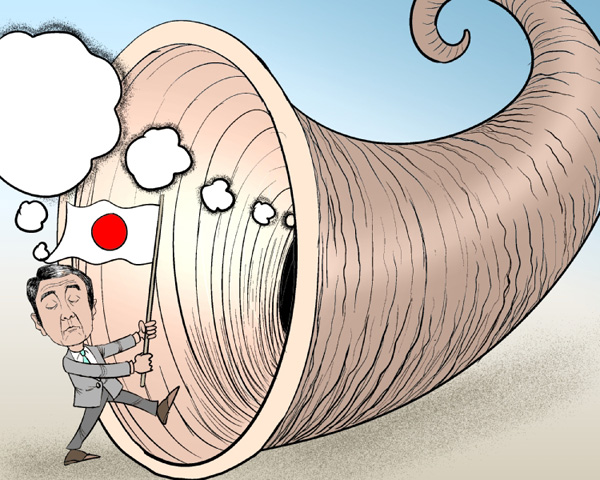Abe's shrine visit damages Japan's image
- By Huang Xingyuan
 0 Comment(s)
0 Comment(s) Print
Print E-mail China.org.cn, January 14, 2014
E-mail China.org.cn, January 14, 2014
Editor's note: Huang Xingyuan, former spokesman for Chinese Consulate-General in Osaka and now Ambassador of the People's Republic of China to the Republic of Trinidad and Tobago, wrote an article criticizing Prime Minister Shinzo Abe's controversial and questionable behavior.
|
|
|
Deaf man walking [By Jiao Haiyang/China.org.cn] |
My daughter, who studied at Waseda University in Japan, often asked me a question. "The Japanese people I am in contact with are very friendly, the Prime Minister Shinzo Abe is very popular, so why does China always say it is right-wing?" Shigeru Ishiba, a member of the Liberal Democratic Party (LDP) who was Minister of Defense, also asked me during a Sino-Japanese thinktank forum: "After World War II, Japan has followed a peaceful path, so why does China always say Japan wants to revive militarism?" Soichiro Tahara, a famous Japanese TV host, also asked me: "The Sino-Japanese relationship went through so much and has improved, so how can it now deteriorate again?"
Firstly, let me answer the question about Japan being right-wing. It is not because of what China has said. It comes from what Japan has done. Twenty-five years ago, when I went to work in Osaka, Japanese right-wing extremists often came to the gate of Chinese Consulate-General in Osaka to do unpleasant things. I would talk to the local government and the police, and even talk to the right-wing leaders. But at that time, they were basically well mannered, and people saw them as alternative voices and isolated them. However, today, the activities of the right-wing extremists are rampant, from shouting to smashing the gate and breaking into the consulate and throwing Molotov cocktails. But the major problem is that many Japanese citizens also take part in their activities. I don't know whether it is because the right-wingers' claims get more sympathy and support, or if is because people have to make use of any opportunities to let out pressure under the economic depression of Japan?
Look at the Japanese media: I have dealt with them for more than a decade due to my work. It is not just the right-wing newspaper Sankei Shimbun, even Yomiuri Shimbu and NHK publish extreme remarks and are platforms for right-wing politicians and scholars. No wonder one of the reporters who I saw as a right-wing recently said something that surprised me, like he was criticized by his colleagues as an old fashioned China supporter.
Look at Japanese politicians, from discussion to remarks to visiting Yasukuni Shrine, their activities were questionable. In the past, questionable leaders would resign for their behaviors in the past if they caused diplomatic disputes. Now they use these opportunities to gain support. Look at the textbooks. As the international voices are raised higher in criticism, the textbooks which glorify the war crimes are more and more adopted. If a nation has right-wing groups, a right-wing prime minister, right-wing media and right-wing textbooks, how can you say this nation is not on a right-wing path?







Go to Forum >>0 Comment(s)